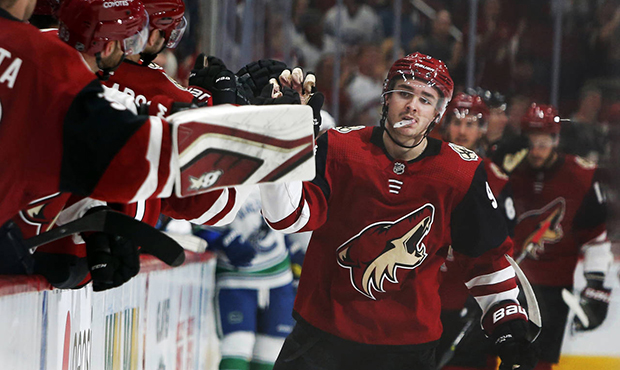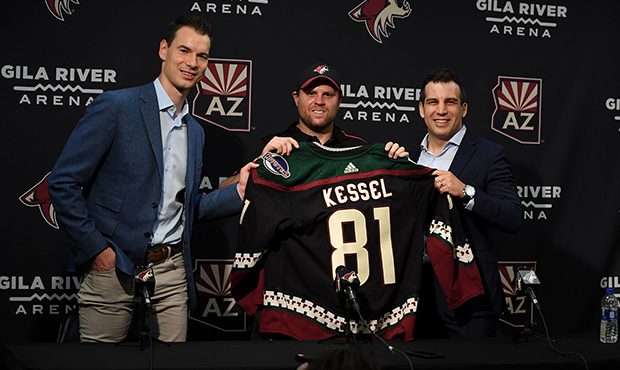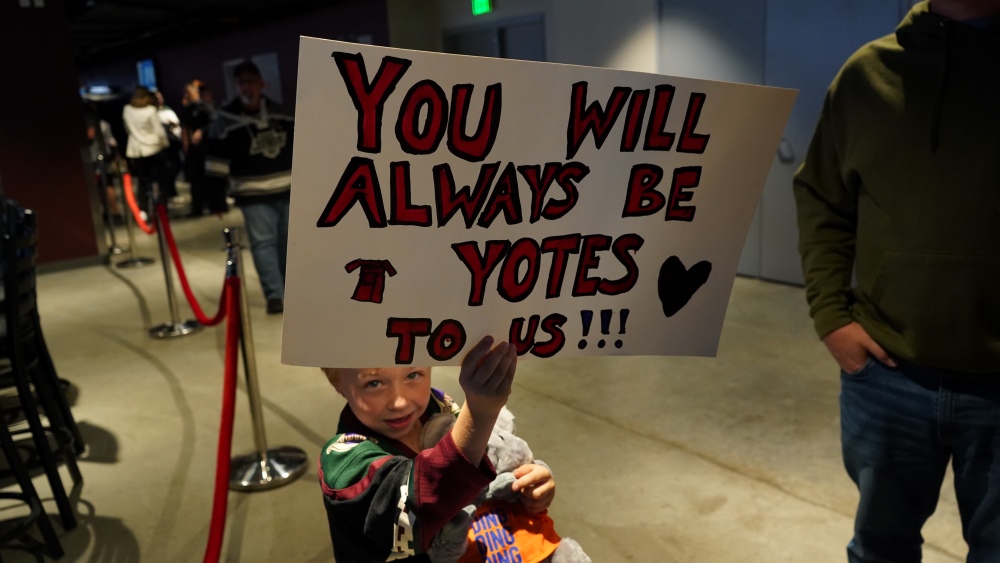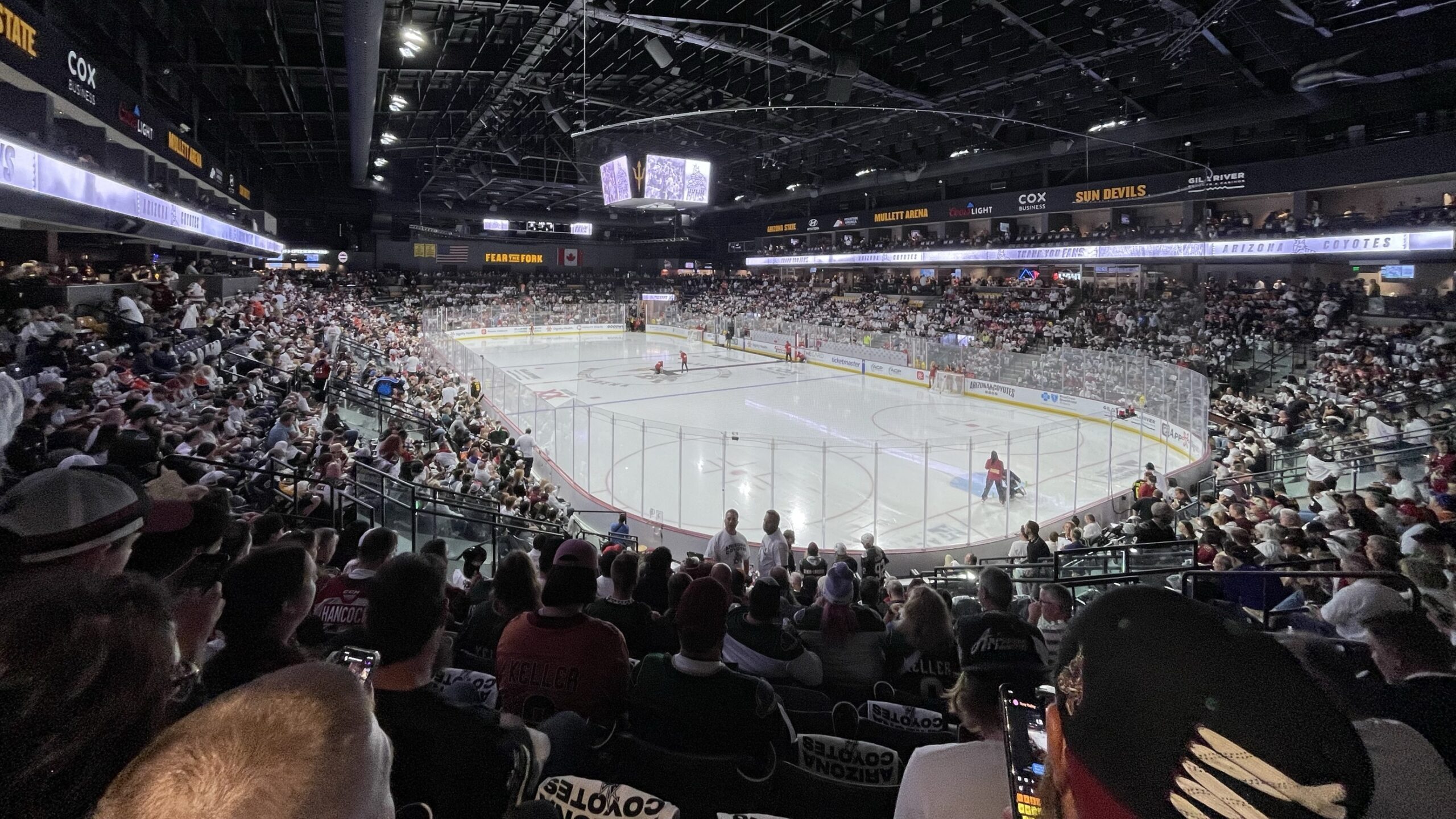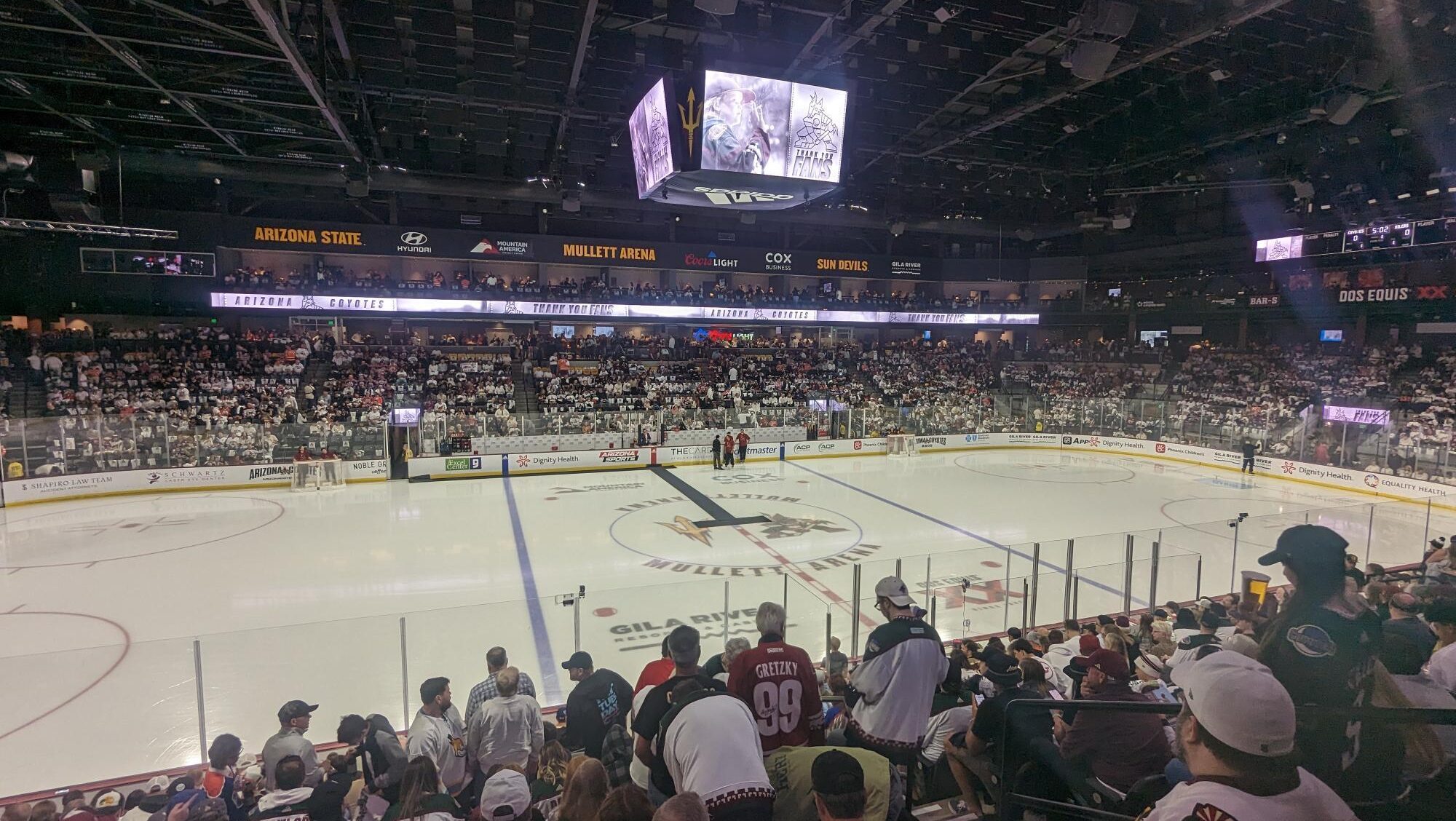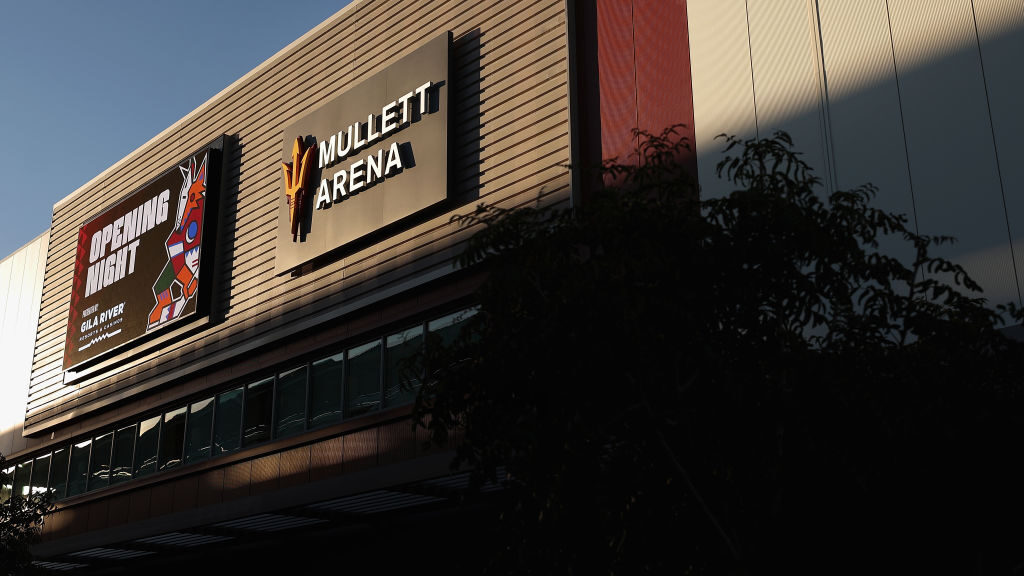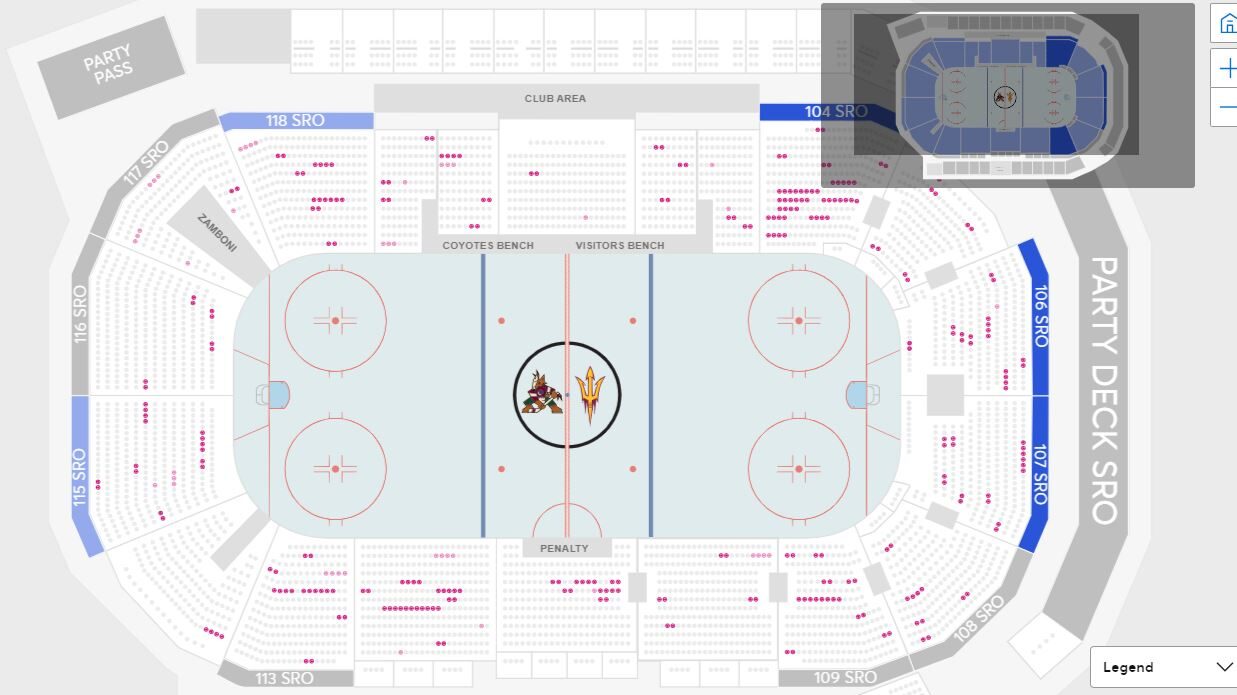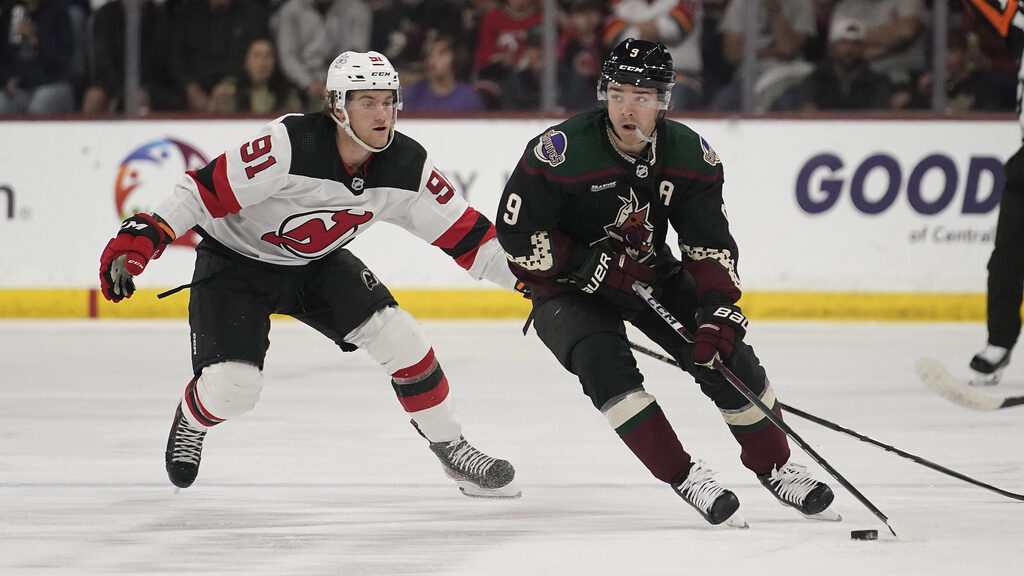Coyotes take risk to seek reward, sign Clayton Keller for 8 more years
Sep 4, 2019, 4:50 PM | Updated: 7:32 pm
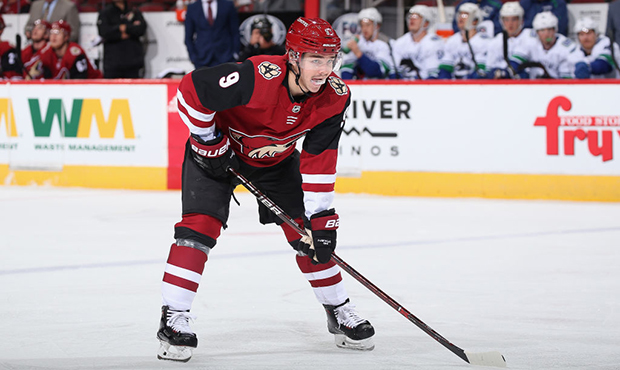
Clayton Keller #9 of the Arizona Coyotes during the NHL game against the Vancouver Canucks at Gila River Arena on October 25, 2018 in Glendale, Arizona. The Coyotes defeated the Canucks 4-1. (Photo by Christian Petersen/Getty Images)
(Photo by Christian Petersen/Getty Images)
GLENDALE, Ariz. — Think back to eight years ago. The hockey team in Arizona was called the Phoenix Coyotes, and they played at Jobing.com Arena. Their best players were Mike Smith, Ray Whitney, Radim Vrbata and Shane Doan. Their head coach was Dave Tippett, and they went all the way to the Western Conference Finals.
Years from now, the Coyotes’ top players might not be a list of names too different than the ones on their roster now. Their general manager, John Chayka, has made a point to lock down young players that he sees as pieces of their future core. In 2024-25, the Coyotes will have a combined cap hit of $22.05 million tied up in Nick Schmaltz, Christian Dvorak, Clayton Keller and Jakob Chychrun. Those four players are currently an average age of 22 years old.
Whatever the outcome, Chayka has certainly shown a willingness to stick to his beliefs and put his chips on the table before the stakes get prohibitively high. He did it again Wednesday, signing Keller to an eight-year extension for a reported $7.15 million average annual value (AAV) that makes the 21-year-old the highest-paid forward on the team next year. It was a risk, one that took conviction and belief in the player for the team to make such a commitment.
“I think at its core, really, the philosophy is that we just don’t want to have to follow the herd,” Chayka said. “We wanted to make a proactive decision. We wanted to make that decision on our terms. And we wanted to make sure it was one that would allow us to keep our core of young players together for a long time and also allow us to build a team. I think there’s risks in any move you make, and in this instance, there’s some risk to make this type of a deal and there also would’ve been risk to just wait.
“I drafted Clayton Keller seventh overall. Some questioned that at the time, as well. I think that will be proven to be a good decision, and I feel the same about this decision.”
TRADING ONE RISK FOR ANOTHER
Next summer, Keller would’ve been an RFA — three pesky letters that as of Wednesday were the callsign of a group of unsigned stars; players across the NHL wondering when a contract standoff with their team will end and allow them to get back to work. The Coyotes and Keller avoided that.
They also avoid watching Keller’s play take off in 2019-20 and driving up his asking price with each goal and assist, leading Chayka to wonder how the team will get him signed to an extension.
But in circumventing those risks, the Coyotes take on another risk in its own right: Keller needs to be the player the Coyotes are convinced that he is in order for this deal to be the team-friendly one they hope it someday will be.
Chayka hinted that “there’s going to be some macro factors that affect the cap and what players are paid.” Translation: As the cap goes up and player salaries go up, in a few years, Keller’s $7.15 million AAV won’t be what $7.15 million is today. It will be diluted by market inflation. That, combined with Keller progressing, could make this deal extremely palatable.
“Unfortunately, the way the market works here is if you become reactionary and just wait for players to produce and then react to that, and you’re waiting for everyone to have a good year before you sign them, then you’re going to struggle to find value deals, keep your team together and be a sustainable winner,” he said.
“This deal got done because Clayton Keller wanted to be here long-term. You go around the league and understand what’s occurring, and shorter-term is the trend. Those are deals that the AAV might start a little lower, but ultimately, you lose control of the player, they reach free agency and they get more flexibility of movement, and as we’ve seen, if you want to wait then it starts breaking up your team.”
WHAT COMES NEXT?
The paradox of the narrative surrounding Keller is that he was an All-Star as a 20-year-old, but he’s been described as having a down year. He led his team in points, but reaction from fans to news of his extension was somewhat mixed. He had 65 points in his first year and 47 points in his second. What will his NHL career look like?
“You can either frame it as a player who struggled last year,” Chayka said, “or you can frame it as a player that broke a lot of records at the U.S. National Development Program, was one of the top players in college hockey, won at World Juniors, came in first year and broke all of our franchise records in terms of offensive production and is learning to grow and still has a lot of room to grow, but someone that we want to have as part of the long-term of our organization. So that was our thought.”
Keller told reporters in a conference call on Wednesday that he’s been training all summer and working particularly on his shot, one that produced 23 goals his rookie year and 14 goals last year.
But keep in mind, too, that Keller, like the whole team, might benefit next year and beyond from having healthier personnel. They were battered by injuries to key players last year, removing offensive producers like Schmaltz, with whom Keller seemed to work well on the ice. It also helps that Arizona brought in Carl Soderberg and Phil Kessel this offseason, further bolstering the group Keller will play with.
“I think with a healthy team, we’re a really tough team to beat,” Keller said. “We’re going to play a fast style of game, and I couldn’t be more excited to get Phil and Soderberg and guys that are really going to help our team and help us be more successful this year.”
Chayka, on that matter: “Obviously we’re betting on him rebounding with our team. Having a Phil Kessel, having a healthy Nick Schmaltz, having some other guys around him that bring speed and skill, certainly our bet is that last year was a down year and he’ll continue to improve and get better as his contract matures and as Clayton matures. Hopefully it’s one where it’s good for the player and good for the team.”
In 2019-20, barring a big acquisition of another highly-paid player, Keller will be the second-highest paid player on the team behind Oliver Ekman-Larsson. That, and Chayka’s acknowledging that signing Keller is a risk, should be statement enough that he believes strongly in what Keller can do. And the team seems to feel that the risk of getting it done now is better than the risk of waiting until later.
“I think in order to try to win a Stanley Cup, you’ve got to take risks, and you have to do some things that sometimes, short-term, make you a little uncomfortable, but long-term, you believe is the right thing for the organization,” Chayka said. “Again, I just know that following the herd will ensure that you’ll never be No. 1. And we didn’t want to do that.”

